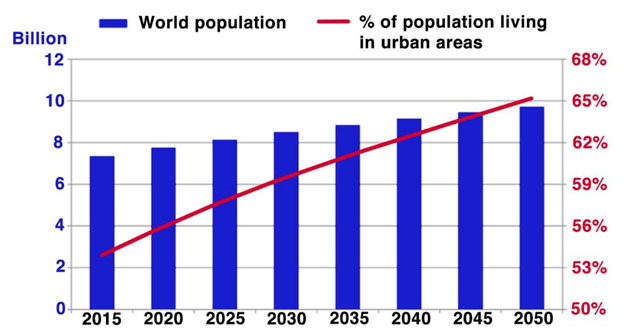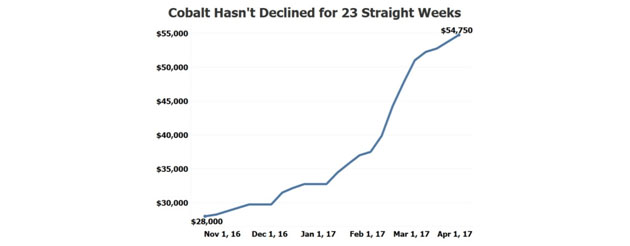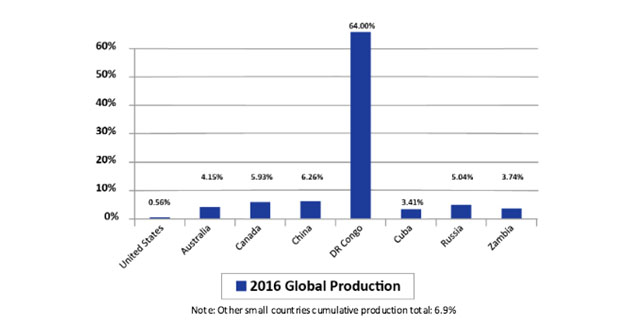https://www.theaureport.com/pub/na/elon-musks-worst-nightmare-child-labor-and-cobalt-supply
According to the UN, 2007 marked the year where the majority of Earth's population lived in urban areas, rather than rural ones, for the first time in history. Over the next decade, the world is expected to add a billion people.
By 2030, our planet will be made up of a population of 8.5 billion, with 59% living in urbanized areas.

Technology and innovation will certainly be at the forefront of accommodating this population growth, and behind all of this new technology is the natural resource market.

Industrial metal demand is projected to jump 16% this year, according to the World Bank.
Not only is demand continuing to rise, but we've seen major supply constraints, with mine depletions and disruptions in Australia, Chile, Indonesia, China and Peru.
One industrial metal is set to soar much higher due to critical supply shortages—it's been a little-known mineral for centuries, but modern-day life can't sustain itself without it.
We've all seen this before: Commodities that are in high demand and have little supply always go through massive price spikes in a relatively short period of time. Wealth Research Group uses a methodic due diligence strategy, outlined here, to navigate through hundreds of ineffective mining projects in order to find the few that pan out in a big way.
We saw it with zinc in 2005 (up 403%), uranium in 2006 (up 778%), molybdenum in 2007 (up 809%) and silver in 2010 (up 443%).
However, the current shortage in cobalt dwarfs anything the world has ever seen.

Cobalt is up 150% in the last year, but it's likely to see far higher prices due to a severe deficit.
According to Macquarie Research, the deficit for the next year will be 885 tonnes. In 2019, that number rises to 3,205, and by 2020, we are looking at a 5,340 tonne supply shortage!
The importance of this cannot be understated—in the lithium battery, there is more cobalt than lithium.
Tesla, Apple, Google, Toyota, BMW, General Motors, Nissan, Ford and many other corporate giants are going to be fighting over supply!
Hedge funds are also taking positions, with Chinese and Swiss funds buying up physical supply in order to sell at much higher prices in just a year or two.
At Wealth Research Group, we are taking positions in the sector, but since there aren't any ETFs or futures exchanges where we can gain exposure to the metal, we initially had to look at nearly 60 lithium exploration stocks, and we could only find a total of 24 cobalt-related stocks on North American exchanges. While all 60 lithium exploration stocks own projects that are focused primarily on lithium, 19 of the 24 cobalt-related stocks were actually focused primarily on copper, nickel, gold or silver.
Most of their projects contained tiny amounts of cobalt that they hoped to one day produce as a byproduct of the main commodity.
Only five companies with projects that were primarily focused on cobalt exploration were available, and two of them were located in the Democratic Republic of the Congo, a politically unstable region responsible for 60% of the world's current cobalt mining supply and where child labor has become a major concern.
America's largest corporations that use cobalt as a raw material are being pressured to ban cobalt imports from the Congo. Human rights organizations are demanding that they secure all cobalt supplies from ethical mining sources.
The company that Wealth Research Group found is advancing its Silver Centre and cobalt projects in Ontario, Canada.
One of its big investors is Robert Cross, a mining legend who is the founder of B2 Gold, a $3 billion company. They call him "the millionaire maker," and when we spoke with him, he told us First Cobalt was his largest single position in the entire sector.
Management has a proven record of discovery, funding and the development of producing mines.
This team is looking to expand in North America and Africa, with Peter Campbell, one of the few industry leaders for cobalt, joining the company on March 29.
Not only is the technology demand for cobalt surging, but the demand for ethical mines is also playing out to be extremely important to companies like Tesla and other North American battery producers.

BIG PROBLEM: 64% of cobalt supply comes from a single location: the Democratic Republic of the Congo.
Apple has already begun to crack down on these horrible conditions and unethical Congo mines that are using children.
In an investigation last year, the Washington Post uncovered that many children are working in deadly conditions.
Sky News also reported that the problems in the cobalt supply chain are hazardous and include rampant child abuse, calling the cobalt from many of these mines "conflict minerals."
As you can imagine, iPhones and Tesla cars—which source their cobalt from child slave labor—are a corporate scandal nightmare, and both of these companies are getting ahead of it.
This, of course, doesn't solve the supply line problem; if anything, it makes it worse.
The demand for ethical cobalt mines is years away from being feasible, which is why a fast-moving company with a rolodex that spans the globe can geographically diversify quickly and has become the favorite for many mining investors, like Robert Cross.
It's a pure play on cobalt, but in this case, the projects are known to have high-grade historical silver mineralization as well.
This is our highest-conviction idea in the cobalt sector.